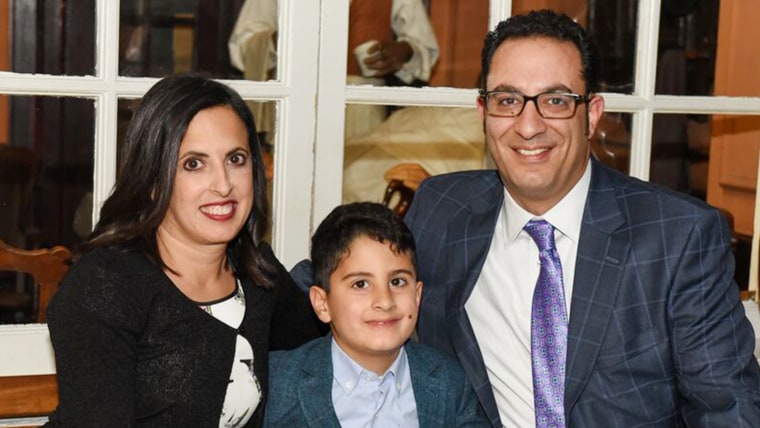Dr. Rana Awdish learned a painful lesson when she was hospitalized for an emergency while pregnant with her first child: The incredible skill of medical professionals can indeed save a life, but can also leave patients emotionally battered.
Awdish, a critical care medicine physician and director of the Pulmonary Hypertension Program at Detroit’s Henry Ford Hospital, writes about her trauma in her new memoir, "In Shock". She shares her story with TODAY.

On May 15, 2008, I was a 35-year-old woman who had everything going for her. My marriage to my wonderful husband Randy was going great. I had just finished my fellowship in pulmonary medicine. I was on top of the world because I was also seven months pregnant with our first child.
My day started like most days during my pregnancy: I was hungry, bloated and nothing fit, including my shoes. I decided to get some new ones, stop for groceries and then meet a friend for dinner.
During that dinner, a benign tumor in my liver ruptured. My entire blood volume wound up in my abdomen, triggering what’s known in trauma world as the "triad of death" — essentially my blood was too acidic and too cold to clot. Because I was bleeding out, my liver and kidneys shut down. I was put on a ventilator. I had a stroke.
My baby died. But I lived thanks to the incredible skill of the people who treated me.
I was in and out of Henry Ford, my hospital, for years. I needed five major surgeries and I had to learn how to walk and talk again. Today, things are good and I’m back at Henry Ford, working full time. I’m also the mom of a 6-year-old named Walt.
I can’t say I’m a better doctor than I was back in 2008, but I’m a different doctor. As a patient, I learned how we medical professionals fail our patients.
I experienced terrible lapses in communication, uncoordinated care and sometimes absolutely no empathy. I remember hearing a doctor say I was trying to die on him. No, I wanted to live, and so did the patients I treated who probably heard me say the very same thing.
One doctor assumed I was an addict because morphine wasn’t working on my pain. It wasn’t working because my body was going through another failure. Another doctor joked they needed to find me a new liver unless I wanted to live in the hospital forever. It wasn’t funny then. It isn’t funny now.
A nurse came into my room a few days after I was admitted, saying I should hold my baby. She was among the team that tried to resuscitate her. She started talking about how my baby’s skin was going to deteriorate and I should hold her now. I told her no, but that apparently wasn’t the right answer. She said all babies should be held by their mothers at least once.
That’s great in theory, but it wasn’t right for me. My mom held my child while I was bleeding out. So did my husband, who told me his wedding band fit around her leg. Holding a body that was starting to decompose was not going to provide any kind of closure for me.
During my hospitalization, I found some unlikely heroes, like the transporters. One gentleman who took me to radiology heard me break down when I was asked about my baby, whose little wristband was still attached to my chart. He took it upon himself to tell his colleagues and others not to ask about her. Radiology techs started to throw a lead blanket over my sleeping husband when they would come into the room to take a portable X-ray. They figured out on their own it was kinder than waking a man who was sleeping only a few hours a night.
These kindnesses matter. As, of course, does skill. Every medical professional who helped me was skilled. But it just wasn’t enough.
I shared my story with our administration and told them we are failing patients. They took it to heart and we now have formal training programs to help with patient communication and empathy.
Medicine is tough and complex and I get it — no one has any time. But the ideal still needs to be that every patient matters. Every employee can do something to mitigate the suffering of patients who come through our doors. Everyone is essentially more than their job descriptions.
We are not perfect, but every day we learn from our mistakes.
As doctors we are always striving for professional perfection. For some patients, maybe that’s enough and they don’t want their doctors or hospital staff to empathize with them. I never thought I would. I was wrong.
I’ll always remember an older doctor coming up to me at the hospital. He told me he was in our ER for an intestinal blockage, a pretty serious condition, especially for someone his age. He said he was scared because he was alone.
He said his doctor was very good, very smart, and obviously very busy. But that doctor sat down and held his hand. My colleague was a little embarrassed relaying the story, not because he needed someone to hold his hand, but rather that he never held the hand of a patient. He didn’t think it was his job.
I’m glad today one of our colleagues showed him that maybe it is.
As told to TODAY contributor Joan Raymond. To purchase Dr. Rana Awdish's memoir, “In Shock”, go here.
TODAY has affiliate relationships, so we may get a small share of the revenue from your purchases. Items are sold by the retailer, not by TODAY. All prices are subject to change and items could sell out based on the merchant’s inventory.